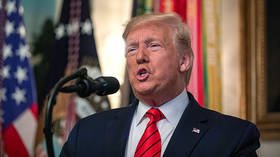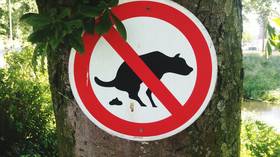US wild-card candidate Don Blankenship says he hopes to break two-party dominance – and that’s why the government’s afraid of him
Former coal industry executive and ex-con Don Blankenship doesn’t expect to become commander-in-chief, but hopes to usher in a movement to break the Republican/Democrat stranglehold in America.
Donald Trump and Joe Biden aren’t the only two men in their 70s battling to be President of the United States.
The third is Don Blankenship. He is the Constitution Party’s nominee, but is under no illusion he has a chance of winning. So, why bother campaigning?
As Blankenship himself says:
We know we won’t win the Presidency this time, but I hope I am showing there is a dire need for change, and the government and media are working arm in arm to misinform the American public.
"Over time, maybe we can get there, and at least we'd know we tried. It’s pretty hard to get any attention or publicity, but we’re in dire need, so I keep trying.”
Blankenship carved out a career in the coal industry, rising to become the chairman and CEO of Massey Energy. The firm employed around 6,000 people and controlled 2.3 billion tons of coal reserves. It was big business, and when the company was purchased for $7.1 billion, Blankenship earned $86 million.
Disappointed in Republicans
During his career, Blankenship was the biggest Republican donor in West Virginia and helped convert it from a Democratic state. And it’s been that way ever since George W Bush ran in 2000.
Blankenship recalls a Labor Day event in 2009 that drew 100,000 people: “I think that made the left scared, and they’ve hated me ever since I stole Labor Day from them.”
However, it wasn’t long before he became estranged from the Republicans. It involved a tragic event at the Upper Big Branch Mine, which exploded in April 2010. Twenty-nine miners died and Blankenship ended up in jail for 12 months, convicted of conspiring to willfully violate mine health and safety standards.
His own explanation of his involvement is as follows: “I hadn't been at the mine in 10 to 12 years, but I was the president of the parent company, so they tried to convict me of three felonies.
“I was found not guilty by a jury just a few miles from that coal mine of any felony charges, but they put me in prison for a misdemeanor which amounted to the coal miners telling each other that federal inspectors had arrived, which they do all the time. But they turned it into a crime and put me in prison.”
Blankenship published a book earlier this year, titled Obama’s Deadliest Cover-Up: They All Have Blood on Their Hands. In it, he alleges the government conspired to pin the blame on him.
“They weren't interested in the truth. It was like [there had been] a plane crash and they said Boeing caused it before investigating,” he says. “Biden and Obama knew their administration had caused the explosion, so they were on the defensive.”
After completing his sentence, Blankenship resumed his political activities and ran for the Republican Senate seat for West Virginia in 2018. His campaign began to gain attention because of his spell behind bars – so much attention, in fact, that Fox News ran a televised debate featuring all three candidates.
Blankenship explains: “There's a huge story here that shows the political system in the United States is broken. They thought I couldn’t win but when I got close to the lead, Fox News decided to have that debate.
“After it, I was anywhere from eight to 18 points ahead, so they called me a racist, an imbecile, an idiot, a felon... all those type of things on national television, and they managed to beat me.
“I’d already said I wouldn’t vote for the current Republican leadership in the Senate, as they hadn’t done a good job and had wasted a fortune. So, Mitch McConnell, who is the head of the Republican Party in the Senate, decided to make sure I didn’t win.”
He is certain a concerted campaign was waged in the media to sink his bid.
“Even though I’d been imprisoned for a misdemeanor, they announced on national television dozens of times and in the media hundreds of times that I’d gone to prison for a felony. Fox even said I’d gone to prison for manslaughter.”
The big story was that a non-established Republican who’d been incarcerated was about to win a Senate seat, so the national media and the Republican Party went out of their way to defeat me.
Blankenship is pursuing legal action against several major media platforms, including Fox, CNN, and MSNBC.
“The lawsuit has progressed quite well, and we’re at the point of depositions,” he says.
"I’ve got evidence they knew I wasn’t a felon, [and that] they basically slandered me to interfere in the US election of 2018. The case is scheduled for trial next year, so we’ve cleared the first hurdle and it will become a big thing.”
The judiciary has revealed publicly that not all of the original documents had been made available for Blankenship to defend himself, and there are therefore calls for his conviction to be overturned.
Policy goals
Blankenship is now firmly with the Constitution Party and has three major policy initiatives.
When it comes to the first, equality, his position is simple: he believes the issue is being politicized by the two major parties for political gain: “You can’t give a privilege to one race and not be taking a right away from another race. It’s been 155 years since the Civil War and we’re still having riots. It proves it’s not working.”
If we really believe everyone is equal, we have to treat everyone equally and not make it a political football.
The second is ethics. “Government corruption is what I call legalized corruption,” he says. “They raise money by saying we’ll bring this legislation to the floor or not, depending on whether people pay them.
“They control the money and the message. They can do things the government shouldn’t be able to. A parallel is the old Soviet Central Committee. Their purpose is to choose party members they like and reject those they don’t.”
The third, as he puts it, is exactness. What this means for him is getting equal coverage with the bigger candidates, so the public is clear about both his existence and his message: “The media would never cover an event I had. They won’t show up. So, it’s about what they want to tell the people.”
Climate change
One other area where Blankenship has expertise is climate change. Unsurprisingly, for a former coal magnate, he is not a fan of banning fossil fuels, and believes economic growth has to take precedence over meeting climate change goals. In fact, he doesn’t believe those standards can be enforced in earnest at all, and are merely another political tool.
“I’m an advocate of using the lowest-cost energy, but we should use it with good environmental stewardship,” he says.
"What they do is put such high standards on Western Europe, the United States, and so forth that can’t be economically met. That drives industrial production into Africa and Asia, where you don’t have [the same] environmental standards.
“Then they claim victory by [prices] going down in the US or Europe, but, really, all they’ve done is increase pollution.
"We shouldn’t burn coal without controlling emissions. China has probably [mined] 100 billon tons since the 1980s without any environmental stewardship.
"We need a robust economy, as only when that happens does a country turn to the environment.”
Two extremes
So, while he concedes he doesn’t expect to enter the White House, who does Blankenship think will, after the election?
He says: “Trump likes the same polices I like: returning to the rule of law, controlling the border, making the trade agreement fair for the American worker. I would agree with him 90 percent of the time and Biden maybe 10 percent.
“But neither one of them will be effective, as they don’t appeal to the American people’s desire to find solutions.”
They divide the people by making everything about politics over policy.
“Trump wants to deport seven million illegals, but the fact is, you can’t deport seven million people, as there’s nowhere to deport them to, and some came as DREAMers.
“[In contrast] the Democrats want the borders to be wide open. They are both at the extremes and they continue the argument to bifurcate the country and get reelected.”
And if he did ever become President, what would Blankenship do first?
He’s quick to reply: “To state that Congress is going to be under the same law and processes as everyone else. And I’d put a hiring freeze in there. We’ve got too many people and positions we don’t need.
“The only thing I have over other candidates is I’m honest, I’m grounded, and I don’t care if everyone around me is corrupt, I [still] won’t join them.”
It seems a lonely and frustrating place to be, battling in an election you know you won’t win.
It also seems a strange choice for a man who has earned substantial sums of money, and is of an age where most have retired to take things at a more relaxed pace.
Blankenship concludes: “It’s been 170 years since we elected a non-Republican or non-Democrat president, but I think some day we will. I’m encouraged by how afraid the government is of me.”
















